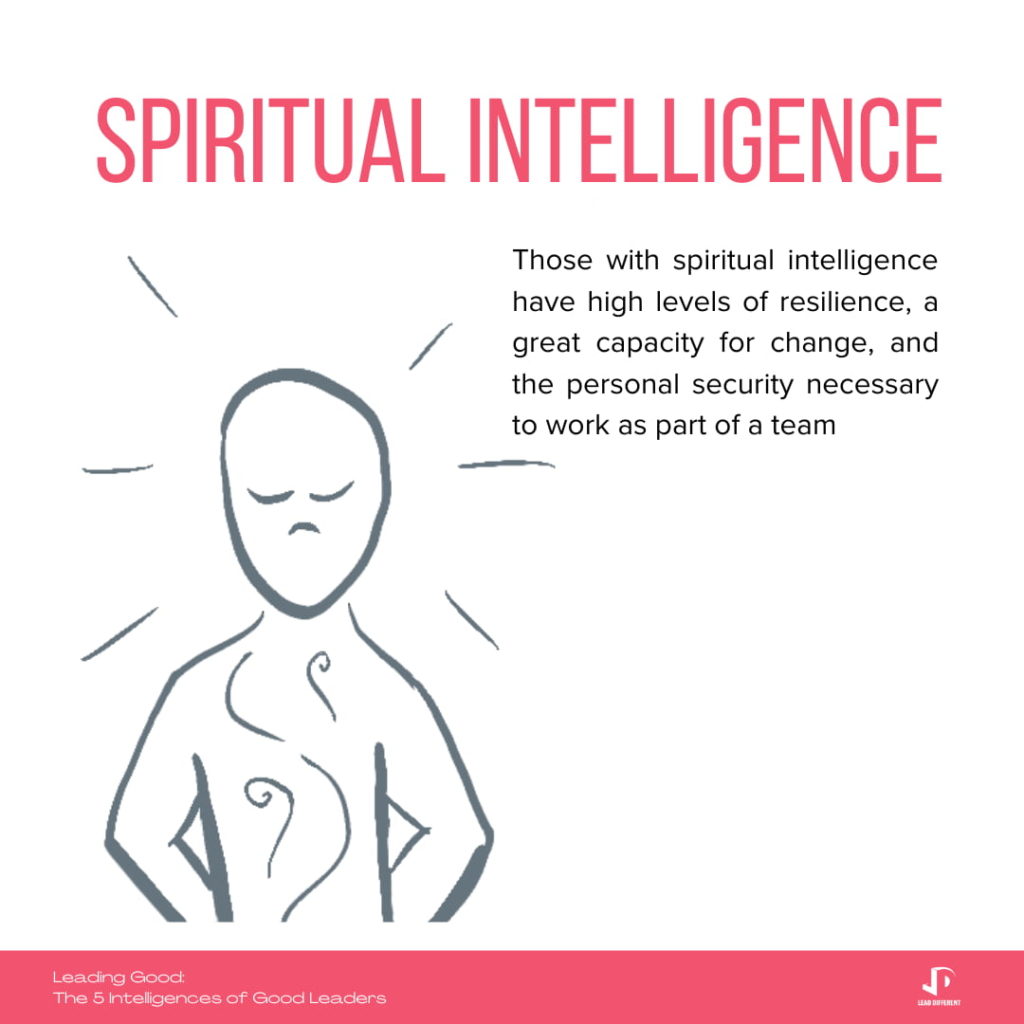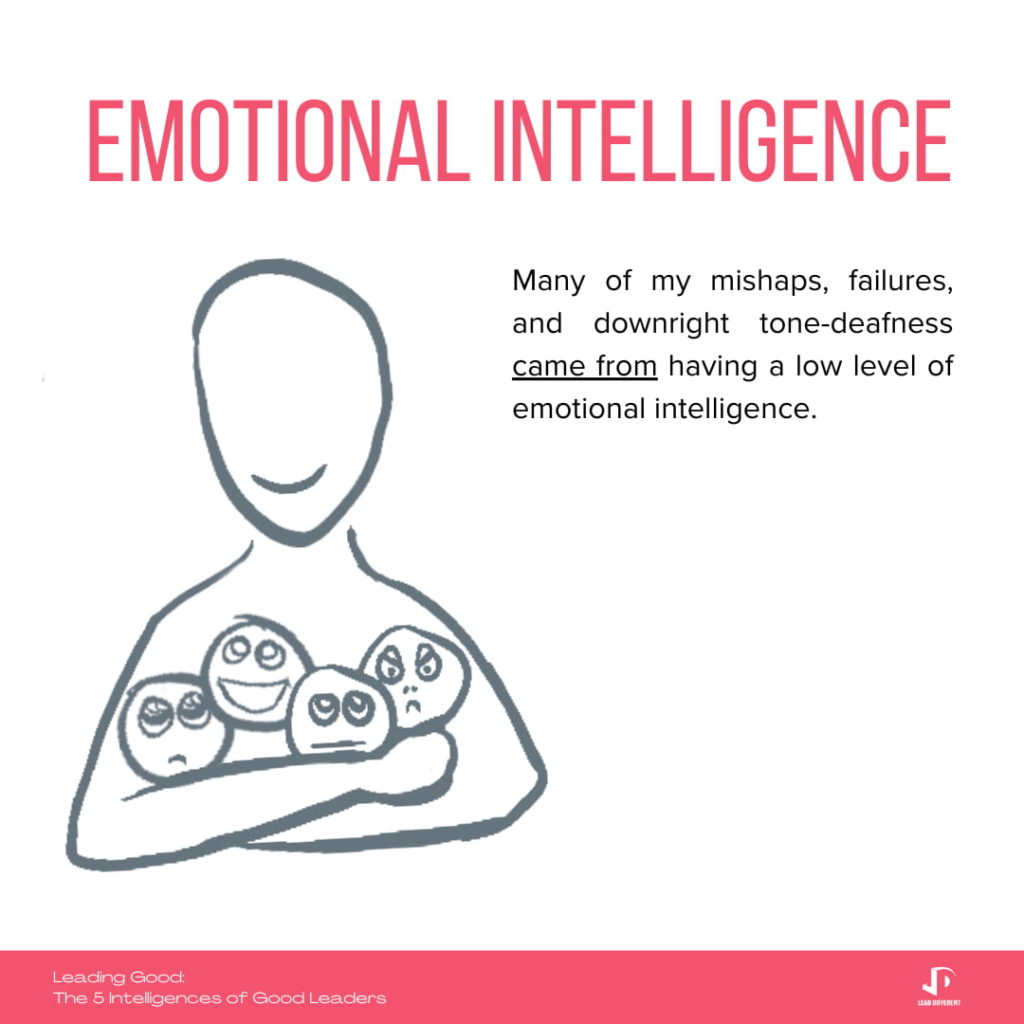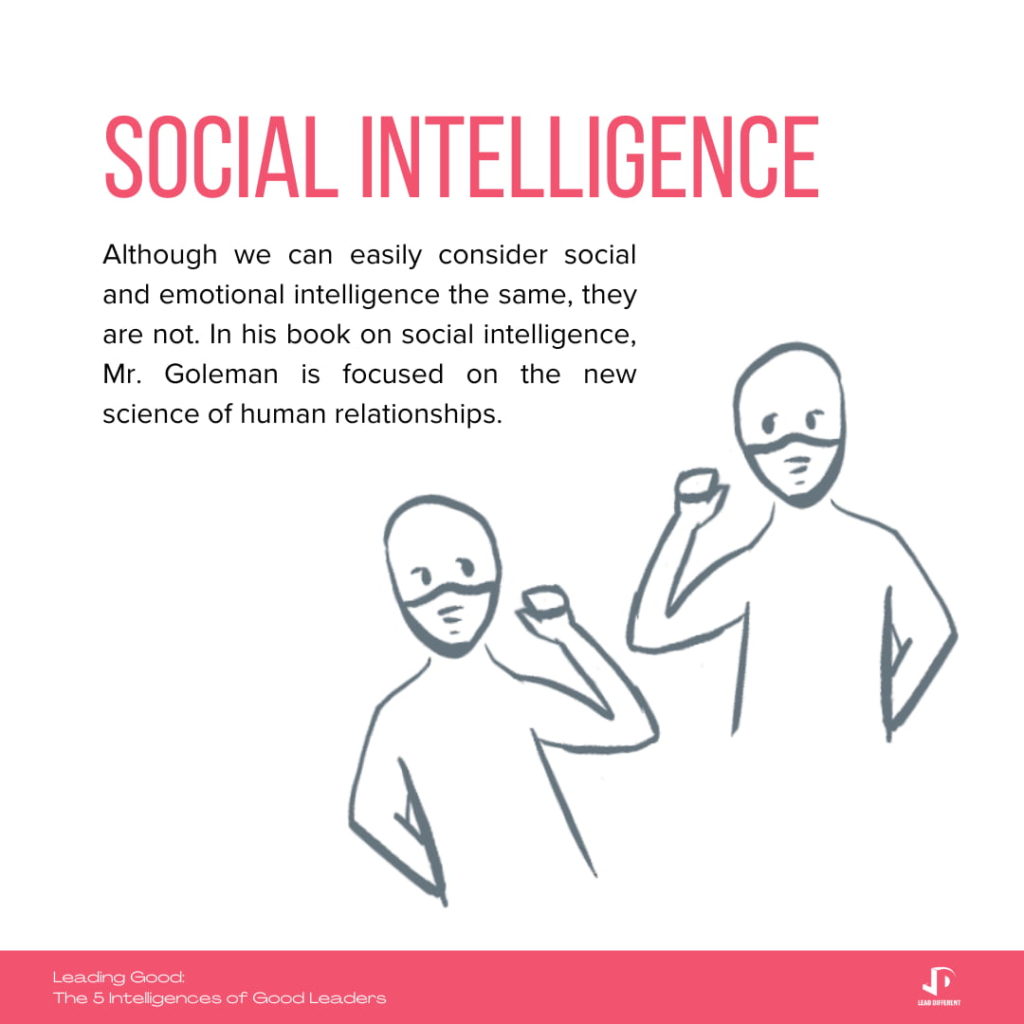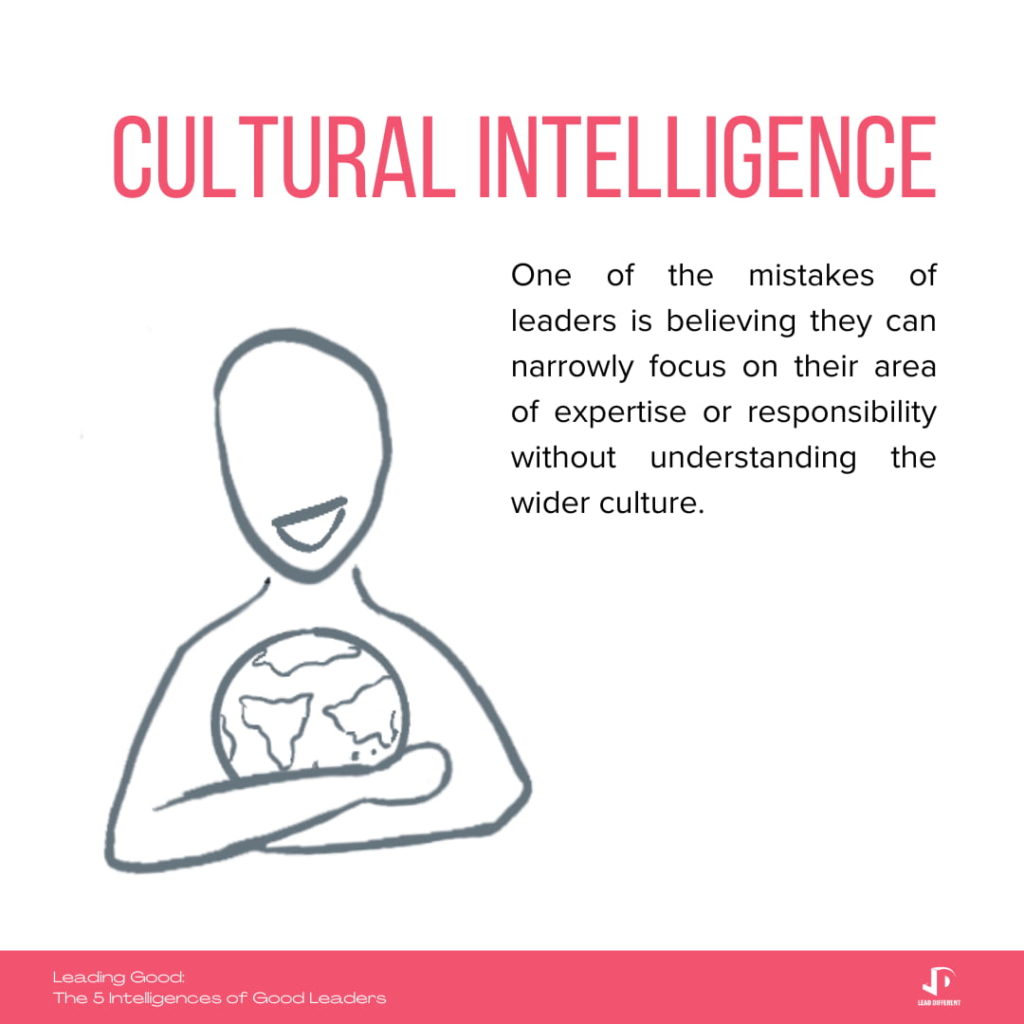
Leading Good: The 5 Intelligences of Good Leaders
February 21, 2018
Russ Ewell
“I believe there exists throughout America today a rampant sabotaging of leaders who try to stand tall amid the raging anxiety-storms of our time. It is a highly reactive atmosphere pervading all the institutions of our society – a regressive mood that contaminates the decision-making processes of government and corporations at the highest level, and, on the local level, seeps down into the deliberations of neighborhood church, synagogue, hospital, library, and school boards.
It is “something in the air” that affects the most ordinary family no matter what its ethnic background. And its frustrating effect on leaders is the same no matter what their gender, race, or age.”
Edwin H. Friedman, A Failure of Nerve
Edwin H. Friedman accurately captures and describes the failure of leadership we are experiencing in the first two decades of the 21st century. Friedman’s book, “A Failure of Nerve, Leadership in the Age of the Quick Fix,” points at a particular problem of courage because, when we lose our nerve, we have lost our courage.
As a leader and student of leadership, my observations about the failure of leadership in the 21st century are not aimed at any particular person, organization, or political party. Rather, they are a statement of belief about the circumstances of our world, a world in which it is obvious to those of us who live, observe, and study leadership that we are experiencing a systemic and institutional global leadership crisis. My goal is to take my nearly 40 years of adult leadership study as well as experience and begin a quest to unearth the answers to the question of how we navigate, and eventually conquer, this 21st century leadership crisis.
My first experience with leadership was running for treasurer in 4th grade, which sounds funny but is relevant, because at that time I didn’t understand how to lead but loved reading about leaders in history. This is how I made the connection between attending Alexander Hamilton Elementary school and the decision to run for treasurer as opposed to president.
Since that first foray into leadership at 9 years old, I have watched, learned from, and been inspired by great and not so great leaders in history and life. I have experienced joyful success and painful failure as a leader, both as an individual and as a part of teams in the secular as well as spiritual realms.
My claim is not to have answers but rather the curiosity to find them. As a very human and flawed person, I am struggling along like everyone else who hopes to develop the ability to serve others effectively, empowering them so they can flourish, reach their potential, and live their best life.
Why Are We in a Crisis?
“America today faces a major crisis in leadership that spans the fields of politics, government, business, non-profits, education and religion. Confidence in our leaders, especially in business and politics, has fallen to an all-time low. Recent surveys by the Gallup poll show that only 22 percent of Americans trust our business leaders. That’s not just a problem – it represents the potential for disaster.”
Bill George, Leadership in the 21st Century
Bill George is professor of Management Practice and a Henry B. Arthur Fellow of Ethics at Harvard Business School, so we can trust that my observation of our leadership crisis is not subjective or amateurish. Mr. George goes on to say something I believe gets to the core of why we have a leadership crisis when he says, “In part, the problem comes from a wrongheaded notion of what constitutes a leader, driven by an obsession with leaders at the top.”
There is in my view an unhealthy obsession with leaders at the top and a failure to appreciate team leadership as well as grassroots leadership. There must be a collective effort to lead if we are to be successful, which is why the founders of America emphasized “We The People” – not so the people could be the judge of whether a job had been well done, but so they could participate in the work of leading at all levels. This need for participatory or collective leadership has been made more important and urgent with the rise of the internet and the extraordinary communication connectivity we are experiencing.
Unfortunately, there is little training being provided to leaders on how to navigate a world that is moving, communicating, and changing at an exponential rate. There is no question in my mind that the capability of today’s leaders is not keeping up with the speed of change. What’s more, those who are being served or led are not any more prepared or capable of working with, helping, or following today’s leaders for the same reason. The 21st century has upended, disrupted, and is currently eroding our organizations and institutions, from the nuclear family to Fortune 500 companies, because we lack the collective leadership skill and will to navigate it.
The frustration of our collective failure to lead together has resulted in a skepticism and cynicism toward those who are leading, creating an adversarial relationship between the led and the leaders. Instead of a healthy culture where the led are empowered and the leaders secure, we have something far less productive – an adversarial culture of mutual criticism and denigration, which have created a cycle of counterproductive and self-destructive behaviors by both the leader and the led.
One increasingly common but often ignored consequence of this adversarial culture is that some of societies’ most capable leaders are choosing private rather than public life. In the private sector, these skilled leaders can start their own companies and own forms of stock or equity that give them more control of their lives, so that they cannot be so easily turned upside down by the opinions of various interest groups, competitors, or naysayers.
None of this is to say that leaders shouldn’t be criticized, because anyone who affects the lives of others should welcome input. If they are tone-deaf to input, then it is only natural that those opinions will become criticism. Yet this still lines up with my thesis which is, unless we can create the proper collective leadership culture, we will end up with less skilled leaders, more frustration on the part of those being served or led, and an ever growing tension between the leaders and the led.
In my view, as badly as things are going now, they will get worse, as evidenced by the 2016-2018 socio-political climate of never-ending conflict, gridlock, stagnancy, accusation, and obfuscation of truth. These all exist because we lack the leaders, institutions, and organizations capable of navigating these turbulent times. Unless we are willing to admit to our current failure and then train a generation of 21st century leaders, we could recycle this failed and negative experience for generations to come.
Where Do We Go from Here?
How can we address this crisis in leadership when we are experiencing a collective cultural amnesia about the history of leadership, ignoring the lessons of history and preferring to engage in endless emotionalism?
We should instead remember the words of Benjamin Franklin when he said, “We must, indeed, all hang together or, most assuredly, we shall hang separately.” This means laying aside our urgent differences and focusing on our important challenges, which include learning to adapt, grow, change, and respond with resilience as leaders and those who follow.
Based on my own experiences with and as a failed leader who has had the good fortune to have been surrounded by patient and understanding people who allowed me to grow, it seems clear we need more and varied studies of leadership. These studies need the type of depth that opens our hearts as well as our minds so we can develop and welcome a new type of leader, capable of navigating the tumultuous, changing world of the 21st century.
This leadership research cannot merely focus on those at the top of organizations but must also embrace the collective leadership model, where we see the value of leaders at all levels. It must include those who appear to follow but are in actuality critical teammates who help the most visible leaders create a social rather than individualistic culture, where everyone shares leadership.
The 5 Intelligences of Good Leaders
“Everyone goes into journalism for different reasons—and they’re often idealistic ones. There are investigative journalists, beat reporters, breaking-news reporters, and explanatory journalists. I have always aspired to be the latter. I went into journalism because I love being a translator from English to English. I enjoy taking a complex subject and trying to break it down so that I can understand it and then can help readers better understand it—”
Thomas Friedman, Thank You for Being Late
Before I proceed, let me make something clear. I am on a quest for answers and hope to bring along those who share my interest, concern, and desire to become more effective leaders at every level. In this sense, I define myself in the same way Thomas Friedman defined himself as an “explanatory journalist,” with a touch of Ernest Hemingway’s “experiential journalism,” where I participate in and experience the journey by leading while I learn.
With this said, my initial exploration into solutions to our leadership crisis has led me to what I call “The 5 intelligences” (or capabilities) of the 21st century leader. My hope is that this will be my contribution to the conversation about leadership and how to navigate our current crisis. I plan to introduce my readers to those with expertise, academic rigor, experience, awareness, and capability in each area.
These “5 Intelligences” are spiritual, emotional, social, cultural, and future. In time these categories may change, but for now here is my brief explanation of each term.
Spiritual Intelligence

One of the most undervalued areas of leadership is the need for spiritual awareness and depth. Those without spirituality will often be tone-deaf in their dealings with people as well as their capacity to consider solutions, develop ideas, and have holistic vision for those they lead.
Additionally, those who have a life of the soul tend to overcome the dangerous corruptions of power that accompany leadership. In my experience, those with spiritual intelligence have high levels of resilience, a great capacity for change, and the personal security necessary to work as part of a team. While my personal spirituality is informed by the Christian influence, any type of deep spirituality provides similar benefits.
Emotional Intelligence

Daniel Goleman in his book on Emotional Intelligence does a better job explaining the value of this intelligence than I ever could. What we need to examine is why we are not seeing a wider embrace and passionate pursuit to institute this learning at all levels of our society, especially for those who will lead our organizations as well as those who support them.
In my personal experience, many of my mishaps, failures, and downright tone-deafness came from having a low level of emotional intelligence. I could have used training in this area long before I received significant leadership and hope to advocate for its comprehensive embrace to prepare and train the leaders of the 21st century.
Social Intelligence

Once again, Daniel Goleman is the standard here with his writing on Social Intelligence. Although we can easily consider social and emotional intelligence the same, they are not. In his book on social intelligence, Mr. Goleman is focused on the new science of human relationships. He provides a solid foundation for our examination of the relationship skills of those who would lead us in the 21st century as well as the relationship cultures they are building.
This last idea of relationship culture is more important today than in the past when organizations were more hierarchical. There are tremendous examples of leaders who have this intelligence, so we will highlight them and try to learn from and spread their wisdom.
Cultural Intelligence

One of the mistakes of leaders is believing they can narrowly focus on their area of expertise or responsibility without understanding the wider culture. This might work for a college or professional coach on some levels, but in this integrated, interconnected, and diverse world of shared ideas and values, the leader who ignores culture will be detached, lack an understanding of diversity, and fail to inspire because he or she is unaware of where the wider culture is headed, what it considers important, and how to communicate and promote their organization’s interest effectively in that culture.
Future Intelligence

The final intelligence I call future intelligence, because this is where vision comes from. Those without the ability to approach the past and present from a multi-disciplinary approach as expert generalist (with knowledge of politics, education, technology, business, culture, religion and more) will have little capacity to look toward the future and develop an inspirational vision of tomorrow for their organizations, in order to sustain their relevance as the years and decades go by.
These “5 Intelligences” are not a list of natural-born talents but rather developed skills for what I call “Leading Good,” all of which are necessary for the 21st-century leader as well as the institutions and organizations they lead. I hope you will join me on this journey of discovery, which is one I am confident will change not only our lives but the world as well.

